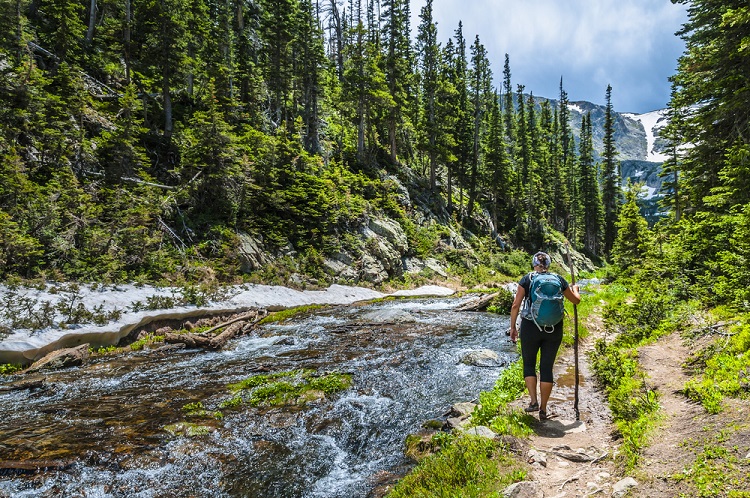The outdoor industry focuses on restoring, protecting public lands
Here in Colorado, there are many efforts inspiring environmental stewardship
Ali Longwell //February 4, 2020//


The outdoor industry focuses on restoring, protecting public lands
Here in Colorado, there are many efforts inspiring environmental stewardship
Ali Longwell //February 4, 2020//

In an industry sector that boasts sustainability and stewardship for the environment, the outdoor recreation and tourism industries must grapple with the protection of public lands while at the same time getting people outdoors (and using their products and services).
Last week during the annual Outdoor Retail Snow Show, a panel with Cathy Ritter, director of the Colorado Tourism Office as well as Carolann Ouellette, director of the Maine Office of Outdoor Recreation, Taldi Harrison, government and community affairs manager at REI, and Bob Ratcliff, division chief of the National Park Service discussed how they were tackling this issue.
Nationwide, visits to the U.S. national parks between 2008 and 2018 grew from 275 million visits to 318 million. As such, according to Ratcliff, there have been huge efforts by the National Park Service to manage the congestion of travelers in the parks, and ensure they’re remain protected and natural.
The most important strategy to manage this, he says, is through disseminating pre-trip information to empower visitors to be stewards of the environment. In addition, “collective investment from the outdoor industry, nonprofits and stewardship from corporations has been very important,” Ratcliff says.
Here in Colorado, particularly with the influx of new residents, the overuse of hiking trails such as Quandary, Hanging Lake and Conundrum Hot Springs have forced the Colorado Tourism office to jump into action. “There’s been a growing awareness that tourism has a responsibility to protect these locations,” Ritter says. “What we’re trying to achieve is the right balance between the areas that get too much traffic while increasing access to public lands.”
During her tenure, the Colorado Tourism Office, led by Ritter, has increased collaboration and partnerships with other Colorado government offices and nonprofit organizations to tackle this issue head on. This includes a growing sustainability alliance with Leave No Trace, the Colorado Dude and Guest Ranch Association, the Colorado Hotel and Lodging Association, the Colorado River Outfitters Association, the Colorado Association of Ski Towns, the Colorado Association of Destination Marketing Organizations and the Colorado Mountain Club.
With Leave No Trace, the office created the “Care for Colorado Principles Toolkit,” which includes resources — a brochure, video, quiz, poster and more — that other outdoor retailers and businesses in Colorado can share in order to encourage the responsible use of trails and outdoor resources on public lands.
The office also created “Colo-Road Trips” in 2017, which offers over 200 itineraries to visit lesser-known gems across the state. Collaboration also played an important role in this as Colorado outdoor companies and organizations “are openly invited to engage with the creation of these itineraries,” Ritter says.
Going forward, Ritter sees that technology will play an important role in increasing access to the outdoors. “There are 38,000 miles of trails in Colorado and apps can guide people to some of the lesser-known trails,” Ritter says.

In addition to efforts on the local level, the panel agreed that there was greater (legislative) changes that need to occur on the federal level. The outdoor and travel industries have helped a number of federal efforts come to fruition included the Restore Our Parks Act, SOAR Act, Recreation Not Redtape Act, the Land and Water Conservation Fund, and dedicated statewide funding for conservation.
“A robust industry isn’t necessarily at odds with conservation and stewardship,” says Nathan Fey, director of the Colorado Outdoor Recreation Industry Office. “In fact, many states are working collaboratively to establish that balance. In Colorado, we are applying lessons learned from where outdoor recreation has had significant impact on our open spaces.”
And as the panel agreed that collaboration between stakeholders is of the utmost importance so does Fey.
“Under this administration, there is strong interest from the industry to work with land managers,non-government organizations, local communities and others to develop a long-term vision and framework for how we advance economic prosperity in Colorado through the outdoor recreation industry with conservation and restoration of our great outdoors,” he says. “Local communities are shifting from extractive economies to recreation and tourism based economies, and it is critical for good planning to inform that transition.”

























